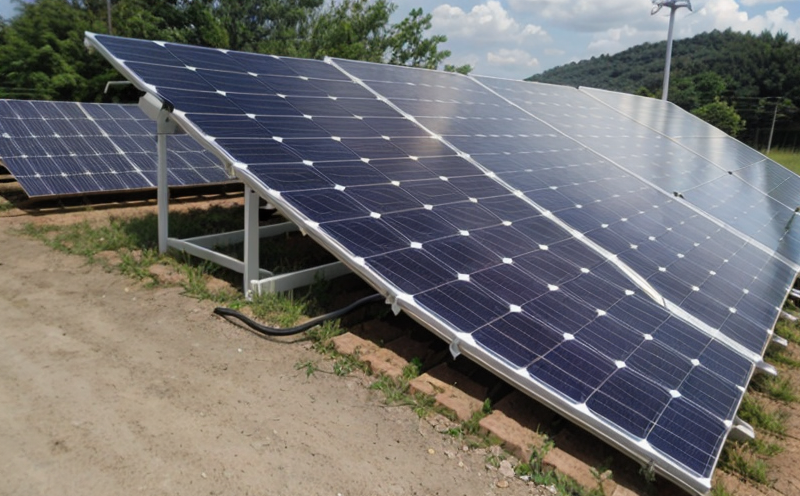IEC 61853-1 PV Module Energy Rating Performance Testing
The International Electrotechnical Commission (IEC) Standard IEC 61853-1 defines the procedures for measuring and rating the electrical performance of photovoltaic (PV) modules under defined environmental conditions. This test is critical in ensuring that PV modules meet the required energy efficiency standards, thereby providing accurate ratings of their performance.
The testing process involves simulating real-world operating conditions to evaluate how efficiently a PV module converts solar energy into electrical power. The standard covers various aspects including spectral irradiance, air mass, wind speed, and temperature to account for environmental factors that can affect the module's output. This allows manufacturers and users of PV modules to have a standardized method of evaluating performance.
The test is particularly relevant in the renewable energy sector where accurate performance data are essential for optimizing solar power systems. By providing reliable ratings, this testing ensures compliance with international standards, thereby enhancing confidence in the quality and reliability of products. The results from these tests can also be used by quality managers to ensure that their procurement processes align with sustainability goals.
The procedure typically involves conditioning the module under specific environmental conditions before conducting performance measurements. These conditions are carefully controlled to replicate real-world scenarios as closely as possible, ensuring accurate representation of the module's energy output. After testing, detailed reports are generated which include a comprehensive breakdown of test parameters and results.
Understanding IEC 61853-1 is crucial for R&D engineers who need to innovate in the PV industry, ensuring that their products meet or exceed international standards. Compliance officers can use this information to audit suppliers and ensure they are meeting regulatory requirements. For procurement teams, these tests provide a robust basis for selecting high-quality materials.
The standard is widely recognized by bodies such as the International Electrotechnical Commission (IEC), ensuring its reliability and acceptance globally. By adhering to IEC 61853-1, manufacturers can ensure their PV modules are not only efficient but also meet international standards, thereby enhancing marketability.
In summary, IEC 61853-1 is a vital tool for the renewable energy sector, particularly in the context of solar panel and photovoltaic module testing. It provides a standardized method to measure performance under controlled conditions, ensuring accurate ratings that are critical for both manufacturers and users of PV technology.
Benefits
The IEC 61853-1 test offers several key benefits to those involved in the renewable energy sector:
- Enhanced accuracy: By simulating real-world conditions, this testing provides accurate ratings of PV module performance.
- Compliance with international standards: Adherence to IEC 61853-1 ensures that manufacturers meet global regulatory requirements.
- Improved product quality: The standardized test process helps identify any issues early in the production cycle, leading to higher quality products.
- Increased market confidence: Reliable performance data from these tests can significantly enhance a company's reputation and credibility with customers.
These benefits make IEC 61853-1 an essential tool for anyone involved in the renewable energy sector, providing both technical accuracy and regulatory compliance.
Why Choose This Test
- Global Recognition: Adherence to IEC standards ensures that the results are recognized worldwide, enhancing credibility.
- Comprehensive Testing: The test covers a wide range of environmental conditions, providing an accurate representation of real-world performance.
- Standardized Procedure: A well-defined process minimizes variability and ensures consistent results across different testing facilities.
- Expertise in Renewable Energy: Our laboratory specializes in renewable energy testing, ensuring that you receive the highest quality service.
Selecting IEC 61853-1 for your PV module performance testing is a wise decision. It not only ensures compliance with international standards but also provides accurate and reliable data that can be trusted worldwide.
Quality and Reliability Assurance
The quality of the results from IEC 61853-1 testing is paramount for ensuring reliability in PV module performance. The process involves several critical steps to maintain high standards:
- Conditioning: Modules are conditioned under controlled conditions to ensure they are stable before testing.
- Data Collection: Extensive data collection during the test ensures comprehensive coverage of all relevant parameters.
- Analytical Rigor: Advanced analytical techniques and instrumentation are used to analyze the collected data accurately.
- Detailed Reporting: Comprehensive reports are generated, detailing all aspects of the testing process and results.
The reliability of these tests is further enhanced by our commitment to using state-of-the-art equipment and employing highly skilled professionals. We ensure that every test adheres strictly to IEC standards, providing you with confidence in the quality and accuracy of your PV module performance data.





